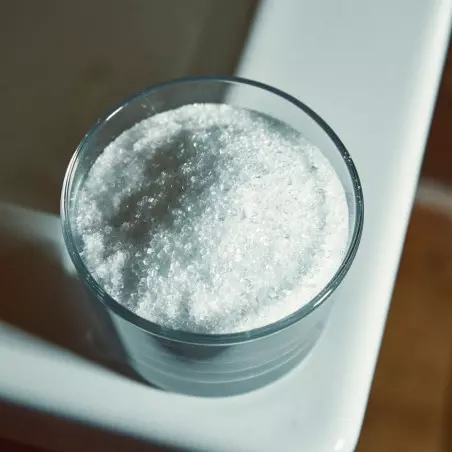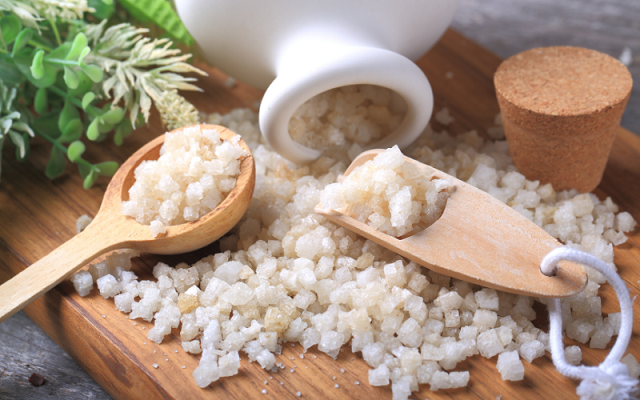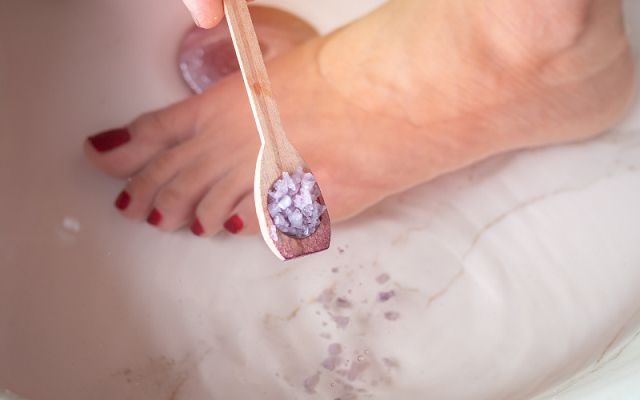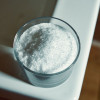Le (The) Epsom salt, scientifically known as magnesium sulfate, is a natural compound recognized for centuries for its numerous health benefits and multiple uses. Its nameEpsom returns to his first discovery made in the mineral springs of the town of Epsom in England. This mineral salt has quickly gained popularity due to its various properties. therapeutic and curative. .
Whether it is for detoxifying the body, improving soil in gardening, or as a beauty remedy, the Epsom salt is a valuable ally with many facets. Let's explore together and in detail the different uses of these magnesium crystals, and how they can be integrated into our daily lives to improve our overall well-being.
What is Epsom salt ?
The story of the Epsom salt dates back to the 17th century, when it was discovered in the mineral springs of the town of Epsom in England. From its discovery, this magnesium salt has been used as a natural remedy due to its healing properties and its ability to treat various ailments, including digestive problems "and the" muscle pain. Over time, Epsom salt has become a popular and widely used ingredient in baths and personal care across Europe and beyond. Today, Epsom salt is extensively used in many fields such as medicine, beauty, gardening, and household cleaning.
The chemical formula of Epsom salt is MgSO₄·7H₂O, It is heptahydrated magnesium sulfate, which contains seven molecules of water. This chemical composition gives it its unique and beneficial properties. The presence of the Magnesium (Mg), which is an essential mineral for the human body, helps regulate muscle and nerve functions, blood pressure, and protein synthesis. The Sulfur (S) is, in turn, very important for the health of the skin, hair, and nails. It is also crucial for the detoxification of the body and the production of certain enzymes.
Le (The) Epsom salt, in its physical appearance, appears as white crystals, similar to those of table salt. These small crystals are soluble in water, allowing for effective transdermal absorption when dissolved in a bath. They have a bitter taste, making them unsuitable for common culinary use.
The benefits of Epsom salt
Le (The) Epsom salt is a mineral with numerous virtues that finds its place in personal care. Its benefits have been scientifically recognized, making this product a must-have at home.
Here are the main benefits of Epsom salt:
1. Relief of muscle pain and soreness
Le (The) Epsom salt is widely used to relieve muscle pain and soreness. Thanks to its richness in magnesium, the Epsom salt helps regulate muscle and nerve function, and this is why it is used by many athletes after intense physical exercise.
To relieve muscle contractures, cramps, and soreness:
> dissolve your Epsom salt In a hot bath, and soak yourself in this bath for a few minutes. This practice will allow the magnesium and sulfate to be absorbed by the skin. The magnesium levels in the body will increase, which will help reduce inflammation and give you a feeling of muscle relaxation.
2. Improvement of sleep quality
The magnesium contained in the Epsom salt plays a crucial role in the regulation of sleep, thanks to its relaxing and anti-stress properties. Its relaxing effect is particularly beneficial for soothing the mind and body. Taking a bath in the Epsom salt Applying it before going to bed allows for the transdermal absorption of magnesium, which can help reduce cortisol levels, the stress hormone often associated with sleep disorders. Magnesium helps regulate muscle contractions and promotes muscle relaxation, which can help create a state of physical relaxation conducive to sleep and promote deeper, more restorative sleep.
3. Detoxification of the body
The bath of Epsom salt is recognized for its ability to detoxify the body, thanks to its unique transdermal absorption properties. Indeed, when Epsom salt is absorbed through the skin, Magnesium helps to relax muscles and nerves, thereby promoting better blood circulation, which allows the body to more effectively eliminate accumulated toxins.. The sulfate ions present in Epsom salt help to remove toxins and heavy metals from the cells, stimulating the skin's natural detoxification process and facilitating their elimination.
4. Skin care
Le (The) Epsom salt It is widely used for skincare, to improve its texture and appearance. It can be used as an exfoliant due to its slightly abrasive crystals that help remove dead skin cells, giving it this attribute. Exfoliating action, thus revealing softer and smoother skin.
Furthermore, the anti-inflammatory and soothing properties "du" translates to "of the" or "from the" in English, depending on the context. Epsom salt can help relieve the symptoms of eczema and psoriasis, such as itching and redness.
5. Stress reduction
As we mentioned earlier, the baths of Epsom salt are renowned for their relaxing properties. Magnesium helps regulate neurotransmitters that reduce stress and can help soothe the mind and body, promoting a general sense of well-being.
Applications of Epsom salt in daily life
Le (The) Epsom salt is a versatile product used in various aspects of daily life. This salt is easily integrated into many routines to enhance well-being and facilitate certain tasks. It is a multifunctional product that can simplify and enrich everyday life. The most common applications of Epsom salt are:
Relaxing and detoxifying bath
It is one of the most popular methods to enjoy the benefits of Epsom salt. This will allow you to relieve muscle pain and relax your body after a stressful day, or even to create a homemade scrub that helps remove dead skin cells and soften the skin. The relaxing effect of the bath can help reduce stress and anxiety, and it can also promote good blood circulation, thus contributing to better overall health.
Ingredients:
- 100 g of Epsom salt
- Lukewarm water
- (Optional) A few drops of essential oil (lavender, eucalyptus, peppermint)
Instructions:
- Fill your bathtub with lukewarm water, warm enough to be comfortable but not scalding.
- Add the Epsom salt in the water.
- Add essential oils if you wish. A few drops of essential oil will provide you with an aromatherapy experience.
- Soak in the bath for 15 to 20 minutes. Try to relax and breathe deeply.
- Rinse yourself with clear water after the bath and moisturize your skin with a lotion or a moisturizing oil.
Foot care
A foot bath at the Epsom salt is an excellent way to relieve tired and sore feet, and to reduce odors.
Ingredients:
- 10 g of Epsom salt
- Basin of warm water
Instructions:
- Dissolve 10 g of Epsom salt in a basin of warm water.
- Soak your feet in the basin for 20 to 30 minutes.
- Dry your feet and apply a moisturizing cream.
Natural exfoliant
Epsom salt is an excellent natural exfoliant for the skin, helping to remove dead cells, improve its texture, and make the skin softer.
Ingredients:
- 10 grams of Epsom salt
- 1/4 cup of olive oil or coconut oil
- (Optional) A few drops of essential oil
Instructions:
- In a bowl, mix the Epsom salt with olive oil or coconut oil. Add a few drops of essential oil if desired.
- In the shower, apply this body scrub to your damp skin using gentle circular motions.
- Rinse your skin thoroughly with lukewarm water.
- Apply a cream or moisturizing lotion after exfoliation.
Uses of Epsom salt in gardening
The Epsom salt has become a valuable addition for gardeners looking to improve the health and productivity of their plants. Thanks to its magnesium and sulfur enriching properties, it can be very beneficial for the soil and plants.. In particular, Epsom salt is very beneficial for green plants, helping to maintain their lush and vibrant foliage. Therefore, this salt is a valuable asset for gardeners, providing a natural and economical solution to improve the health and productivity of plants.
Here are the main uses of Epsom salt in gardening:
1. Improvement of plant growth
The magnesium contained in the Epsom salt plays a crucial role in photosynthesis (the process by which plants convert light into energy), by helping plants produce more chlorophyll, the green pigment in plants. This results in more vigorous growth and healthier, greener leaves. Sulfur, on the other hand, is necessary for the synthesis of amino acids and proteins, which play an essential role in the growth and development of plants. By providing sulfur, Epsom salt helps to improve the overall health of plants by supporting essential metabolic processes.
Be careful not to overdose.! Excessive use can lead to nutritional imbalances and damage plants. It is therefore recommended to have the soil analyzed to determine the levels of magnesium and sulfur before applying Epsom salt.
2. Increase in the production of fruits and vegetables
Le (The) Epsom salt It can improve the production of fruits and vegetables by providing the essential nutrients for their development. If plants suffer from a magnesium deficiency, they may show signs such as yellowing of the leaves between the veins, slowed growth, and a decrease in fruit production. The application of Epsom salt can correct these deficiencies, allowing the plants to regain their vigor and improve fruit production.
3. Prevention of Magnesium Deficiency
Magnesium also plays an essential role in the transport of nutrients within the plant. It helps move vital nutrients like phosphorus throughout the plant, which is necessary for healthy growth. If these plants are deficient in magnesium, it often manifests as yellowing of the leaves between the veins, particularly in roses, tomatoes, and peppers. These magnesium-deficient plants often show slow growth and may have weak stems and pale leaves. The application of Epsom salt is quickly absorbed by plants, which effectively helps to correct magnesium deficiencies.
Uses of Epsom salt in household cleaning
Le (The) Epsom salt is not only beneficial for personal care and gardening, but it can also be a valuable ally in household cleaning. Thanks to its abrasive and disinfectant properties, heptahydrate magnesium sulfate can facilitate and improve many household tasks. Here is how Epsom salt can be used in domestic cleaning:
- Epsom salt can be used to clean tiles and grout in bathrooms and kitchens, making them shine.
- It is effective at removing stubborn stains from clothes and breaking down grease and oil stains. It can also soften hard water, thereby improving the efficiency of your detergent.
- This salt can be used as a natural deodorizer for the home.
- To remove food residues and stains from kitchen appliances, such as microwaves, refrigerators, and dishwashers, use an Epsom salt solution to wipe the internal and external surfaces of the appliances, then rinse with a damp cloth.
- Epsom salt can help remove stains and mineral deposits from dishes, resulting in cleaner and residue-free dishes.
- To clean burnt pots and pans, sprinkle Epsom salt at the bottom of the utensils, add hot water, and let it soak for 15 minutes. Use a sponge to scrub the burnt residues and rinse thoroughly.
Precautions and contraindications
Although magnesium sulfate is widely recognized for its many benefits, it is important to take certain precautions and be aware of the contraindications before using this salt.
Before starting any treatment with the Epsom salt, It is recommended to consult a healthcare professional to prescribe the appropriate dosage, especially if you have pre-existing medical conditions or are taking medications. Additionally, this salt can have dehydrating effects, so make sure to stay well-hydrated before and after an Epsom salt bath. Furthermore, its use on children should be closely monitored, and it is advisable to consult a pediatrician before using it for them.
There are certain contraindications regarding:
- people suffering from kidney failure, as an excess of magnesium can worsen these conditions.
- pregnant or breastfeeding women.
- Diabetic individuals need to be cautious, as Epsom salt baths can affect circulation and magnesium levels in the blood.
- People suffering from high blood pressure or cardiovascular diseases should consult their doctor before using Epsom salt, especially in baths, as it can affect blood pressure.
- people with a history of skin allergies or allergic reactions to other products. Discontinue use immediately if you experience irritation, itching, or redness.
Epsom salt is not recommended for oral consumption unless prescribed by a healthcare professional. Medical advice and strict medical supervision are necessary before any internal use.. Indeed, internal consumption of Epsom salt can lead to diarrhea, abdominal cramps, and electrolyte imbalances.
In summary, although the Epsom salt offers numerous benefits, it is essential to use it with caution and in a responsible and informed manner. By taking the necessary precautions and being aware of the contraindications, you can safely enjoy the benefits of this natural mineral.













